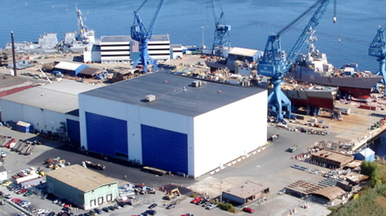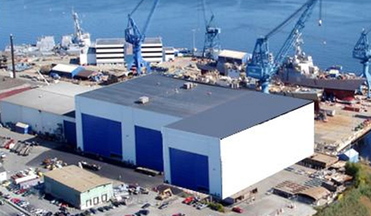A group of Bath residents is objecting to a proposed tax rebate for a major expansion of Bath Iron Works, saying the subsidy is corporate welfare and that BIW is certain to expand regardless of whether it gets a tax break.
Officials at BIW, a subsidiary of the Virginia-based defense and aerospace firm General Dynamics, said it’s possible that if the proposed tax break is denied, they might not be able to expand the facility at all, putting local jobs at risk. The expansion would make the company more competitive and improve worker safety, they said.
The proposed expansion includes a $32 million outfitting hall that company officials say would help secure the future of shipbuilding in Bath. The company is seeking a 25-year city property tax subsidy of about $250,000 a year for the proposed expansion.
The Bath City Council is scheduled to vote Nov. 20 on the subsidy, in the form of a proposed amendment to the city’s Wing Farm tax increment financing district. A discussion and public hearing on the upcoming vote is scheduled for 6 p.m. Wednesday at Bath City Hall.
The Wing Farm district is at the south end of the shipyard, where the proposed outfitting hall would be built.
The outfitting hall would allow many BIW employees who currently work outdoors to move their operations into a climate-controlled facility, company officials said. Such a move would be less hazardous, more comfortable for workers and greatly improve efficiency, they said.
Bath created the Wing Farm district in 2008 to protect the city from losing its existing share of state revenue as a result of BIW’s most recent expansion, which included the addition of its two-bay Ultra Hall outfitting facility.
Normally, when the value of property within a municipality goes up, the amount of state shared revenue that the municipality receives goes down. Establishing a tax increment financing district shields the municipality from losing state money because of property value increases within the district.
Such a district most often is used as a vehicle to provide a tax subsidy on private development within the district, such as a new shopping center or housing complex. The municipality gets to keep its slice of state revenue sharing, and the private developer gets refunded a portion of its yearly municipal tax bill.
Still, the net result of most tax increment financing districts is that the municipality receives less tax revenue than it otherwise would if the development had occurred outside the district. Districts nearly always benefit the property owner and often are used as an incentive to lure new development to the area.
The Wing Farm district is an exception. It currently does not provide a tax break to BIW.
Under the proposed amendment, that would change to a 50-50 split between BIW and the city on the improved property’s estimated $500,000 annual tax burden. The tax break, which only applies to new development and not existing structures, would remain in effect for 25 years.
That adds up to a subsidy of nearly $6.3 million over the term of the agreement. It does not affect the amount of property taxes paid by BIW on land and equipment for the majority of the shipyard, which falls outside the Wing Farm district.
The rest of the yard is divided into two additional districts related to previous BIW expansions that already provide property tax breaks to the company. Those districts were established in 1999 and are set to expire in 2024.
Bath resident Jerry Provencher is part of a group called Bath Citizens for Responsible TIF Action, which includes more than two dozen residents who oppose the tax break.
He said the central question is whether the subsidy is necessary to convince General Dynamics, which reported a $650 million profit in the third quarter, to build the BIW expansion.
“General Dynamics has made over $12 billion in the last six years,” Provencher said.
He noted that the proposed expansion is not expected to create any additional jobs, and that BIW is far too heavily invested in Bath to relocate elsewhere. “There’s no way that they could move,” he said.
Provencher said Bath already has forfeited nearly $49 million in property tax revenue as a result of the two existing BIW districts.
It is impossible to predict whether denying the tax subsidy would help or hurt the Bath community in the long run, he said. “The question before the council really is based on speculation,” Provencher said.
Bath Citizens for Responsible TIF Action plans to host a panel discussion Nov. 13 on the BIW proposal. One of the confirmed panelists is Joel Johnson, an economist with the Maine Center for Economic Policy, a nonpartisan think tank based in Augusta.
Johnson took a neutral position on the proposed subsidy, saying it is a complex issue that deserves more public discussion. Still, he said the arguments should not be boiled down to whether BIW would build the expansion without the tax break.
“If these improvements are made, that’s one thing,” Johnson said. “But the question becomes, ‘How much are the improvements costing Bath Iron Works, and how is that affecting their competitive position?’ ”
BIW Vice President and General Counsel Jon Fitzgerald estimated that if the Wing Farm amendment is approved, the total tax savings to BIW for all three districts would be about $68 million over their respective 25-year terms.
However, Fitzgerald noted that the city stands to receive $100 million in property tax revenue from BIW during that same period. That amount would be less if the expansion were scrapped because the City Council voted against a tax break.
“We tried to do it in 2010 without a break … but financially we couldn’t make it work,” he said.
BIW faces intensifying competition from its chief rival, Huntington Ingalls Industries in Mississippi, Fitzgerald said.
In June, BIW lost to Huntington Ingalls in a key competition to build a series of DDG-51 destroyers for the U.S. Navy.
Huntington Ingalls was awarded a $3.3 billion contract to design and build five destroyers at its shipyard in Pascagoula, Miss., while BIW was awarded a $2.8 billion contract to build four of the ships, with an option for a fifth.
Fitzgerald said Huntington Ingalls was able to bid a lower price for the contract, in part because it is receiving huge state and federal subsidies that BIW does not receive. Approval of the tax district amendment would help keep BIW more competitive, he said.
The proposed outfitting hall expansion would add a third bay to BIW’s “Ultra Hall,” where huge cross-sections of ships under construction are outfitted with pumps, ventilation ducts, motor-operated valves, bunks, lockers, electrical cable, power panels, consoles, light fixtures, motors and sensors.
Doing that work in a controlled setting would allow BIW to build ships more inexpensively, Fitzgerald said.
“I don’t think what we’re proposing is a raw deal,” he said. “We think it’s a fair proposal that lets us invest in an uncertain time.”
J. Craig Anderson can be contacted at 207-791-6390 or:canderson@pressherald.comTwitter: @jcraiganderson
Send questions/comments to the editors.





Comments are no longer available on this story